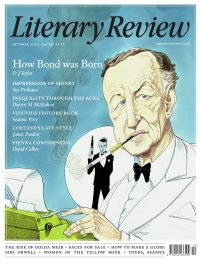David Wheatley
Burdens of a Nobel Laureate
The Letters of Seamus Heaney
By Christopher Reid (ed)
Faber & Faber 820pp £40
‘He wasn’t very linear’, Seamus Heaney’s hero Osip Mandelstam says of himself in a mocking late self-portrait. Was there ever, by contrast, a more straightforwardly linear life than Seamus Heaney’s? Two major events occur at the start of this book: the acceptance of Death of a Naturalist by Faber and Faber and his marriage to Marie Devlin. What ‘incredible good fortune’ he is enjoying, Heaney tells his editor Charles Monteith. Much good fortune later, he wins the Nobel Prize in 1995. It is a life not merely fortunate but ‘reprehensibly perfect’, to borrow a phrase of Philip Larkin’s. What sorrows or secrets lurked behind the smiling public man’s facade?
The Letters of Seamus Heaney does not exactly answer this question. Letters circulate endlessly between Heaney and his publisher, but there is a solitary message to his wife – a poignant ‘Noli timere’ texted from the Blackrock Clinic shortly before the poet’s death in August 2013. There are none of Heaney’s letters to family members here; they are kept behind a seal of privacy that Christopher Reid describes as ‘inviolable’. ‘Compose the frieze/with all of us there’, Heaney wrote in ‘The Seed Cutters’. Not so in this case, and over the course of such a long book this absence cannot but represent a puzzle and a challenge.
We begin not on the family farm but in Belfast, where Heaney took a degree at Queen’s University. Local literary rivalries form a rumbling ostinato leading to irritation. ‘I feel I must get out of Belfast: too many ties and obligations to get a silence for writing’, he writes to

Sign Up to our newsletter
Receive free articles, highlights from the archive, news, details of prizes, and much more.@Lit_Review
Follow Literary Review on Twitter
Twitter Feed
Delighted by this review from @alexander_c_lee in @Lit_Review, and his excellent insights about the challenge set by Pico's thought. Finding the right reader is a book's greatest blessing.
Out now! Literary Review's February 2025 issue, featuring
Ritchie Robertson on W G Sebald
@francisbeckett on miners
@nclarke14 on the colour pink
@TheoZenou on the Pope
Michael Burleigh on Huawei
and much, much more:
Literary Review - For People Who Devour Books
In the Current Issue: Peter Marshall on the Peasants' War * Philip Snow on Hiroshima * Jonathan Sumption on free...
literaryreview.co.uk
Two great bags for your books. Our Literary Review tote bags feature an illustration of our beloved, book-filled office on Lexington Street. Only £10 (lightweight) or £15 (sturdy) at our online shop
http://literaryreview.co.uk/shop